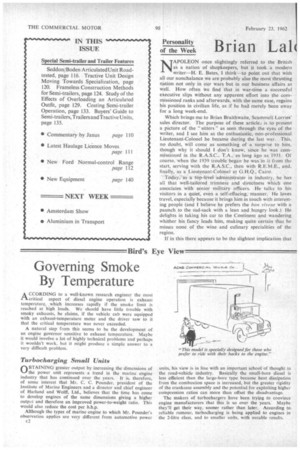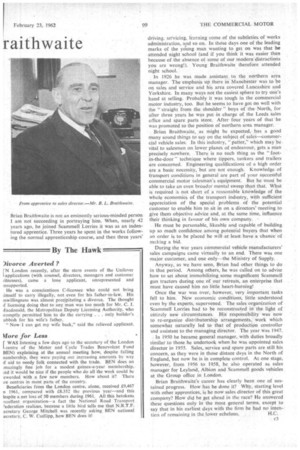Bird's Eye View By The Hawk
Page 42

Page 43

If you've noticed an error in this article please click here to report it so we can fix it.
Governing Smoke By Temperature
CIA CCORDING to a well-known research engineer the most
critical aspect of diesel engine operation is exhaust temperature, which increases rapidly if the smoke limit is reached at high loads. We should have little trouble with smoky exhausts, he claims, if the vehicle cab were equipped with an exhaust-temperature meter and the driver saw to it that the critical temperature was never exceeded.
A natural step from this seems to be the development of an engine governor sensitive to exhaust temperature. Maybe it would involve a lot of highly technical problems and perhaps it wouldn't work, but it might produce a simple answer to a very difficult problem.
Turbocharging Small Units
OBTAINING greater output by increasing the dimensions of the power unit represents a trend in the marine engine industry that has continued over the years. It is, therefore, of some interest that Mr. C. C. Pounder, president of the Institute of Marine Engineers and a director and chief engineer of Harland and Wolff, Ltd., believes that the time has come to develop engines of the same dimensions giving a higher output and therefore an improved power-to-weight ratio. This would also reduce the cost per b.h.p.
Although the types of marine engine to which Mr. Pounder's observation applies are very different from automotive power c2
units, his view is in line with an important school of thought in the road-vehicle industry. Basically the small-bore diesel is less efficient than the large-bore type because heat dissipation from the combustion space is increased, but the greater rigidity of the crankcase assembly and the potential for exploiting higher compression ratios can more than offset the disadvantage.
The makers of turbochargers have been trying to convince engine manufacturers that this is so over the years: Maybe they'll get their way, sooner rather than later. According to reliable rumour, turbocharging is being applied to engines in the 2-litre class, and to smaller units, with notable results.
Jivorce Averted ?
FN London recently, after the stern events of the Unilever Lapplications (with counsel, directors, managers and customer iitnesses), came a lone applicant, unrepresented and Lnsupported.
He was a conscientious C-licensee who could not bring Limself to carry illegally, not even for his father-in-law. His inwillingness was almost precipitating a divorce. The thought if licensing doing that to any man was too much for Mr. C. J. vlacdonald, the Metropolitan Deputy Licensing Authority, who iromptly permitted him to do the carrying . . . only builder's ubbish for his wife's father.
" Now I can get my wife back," said the relieved applicant.
Wore for Less
r WAS listening a few days ago to the secretary of the London
centre of the Motor and Cycle Trades Benevolent Fund BEN) explaining at the annual meeting how, despite falling nembership, they were paying out increasing amounts by way if aid to needy folk connected with the trade. BEN does an amazingly fine job for a modest guinea-a-year membership. Lnd it would be nice if the people who do all the work could be .ewarded with a few new members. How about it? There Lre centres in most parts of the country. Beneficiaries from the London centre, alone, received 19,467 n 1961, compared with 0,352 the previous year—and this lespite a net los3 of 50 members during 1961. All this betokens !xcellent organization—a fact the National Road Transport 7.ederation realizes, because a little bird tells me that N.R.T.E. ;ecretary George Mitchell was recently asking BEN national Lecretary, C. W. Cudlipp, how BEN does it!












































































































































































